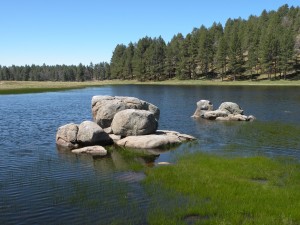The Origin of Earth’s Environmental Problems is Not the Christian World and Life View! Part Four
Long before the twentieth century’s environmental crisis, factors outside the purview of Christianity exploded across the Western world and were ultimately responsible for the Earth’s future environmental exploitation and degradation. In particular, the root cause of today’s environmental crisis was technology running amok without ethical restraints. This began with the scientific and industrial revolutions.
The change from an agrarian economy to one dominated by industry and machines brought about sweeping economic, political, and social changes. The scientific and industrial revolutions resulted in the potential for unchecked technological power over nature and the creation of environmental pollution and degradation as we know it today. It was not the expanding influence of the Christian worldview that caused this, but unbridled technology operating within an emerging secular society.
To keep this in proper context, it should be understood that after the eighteenth century Enlightenment, the rise of modern science and advances in highly efficient technology occurred simultaneously with the fading authority and influence of the Christian worldview. As French historian and sociologist Jacques Ellul stated in his book The Technical Society, “The technical movement of the West developed in a world which had already withdrawn from the dominant influence of Christianity” (35).
Prior to the eighteenth century Enlightenment, the majority of scientists (including those who birthed the scientific revolution—Bacon, Copernicus, Kepler, Newton, and Galileo, to name a few) were Christians who believed God created the universe and mankind and that the Bible provided a general foundation of natural history. Scientists and theologians were partners seeking insight and understanding into God and His creation.
The mutually beneficial relationship between science and Christianity began to change dramatically during and following the eighteenth century Enlightenment. From that period on, Christianity was being shoved off center stage as the dominant worldview in Western culture, and humanity was replacing God as Supreme Being. This reached fruition in the nineteenth century with the publication of Charles Darwin’s Origin of Species (which provided an explanation for the origin of life without God) and the rise of higher biblical criticism (which jettisoned the infallibility of Scripture, thereby removing its authority). Together, these views were the icing on the secular cake and resulted in the liberalization of America’s mainline churches and the demise of the Christian worldview as the guiding moral light in Western culture.
By the twentieth century, humanists openly challenged God’s existence, and science was considered throughout academia as the only criterion for determining truth. The view that nature was a signature of God’s general revelation and an expression of His power and glory virtually disappeared in the scientific community. Thus, by the beginning of the modern environmental crisis in the mid–twentieth century, Christianity was no longer the dominant worldview in the West, and the authority of Scripture outside the church had been largely rejected in popular culture. During the interim between the end of the Christian era and the modern environmental crisis, little ethical constraints arose to control—let alone prevent—the crushing technological exploitation of the earth’s natural environments.
In sum, Christianity did not drive environmental exploitation; the human race did, through its use of unregulated technology. Perhaps, had the church developed an environmental ethos, it could have mitigated the damage wrought by unrestrained technology. However, the fact that by the end of the nineteenth century Christianity had lost much of its authority and influence in Western societies outside the church, plus the unjustified assumption by critics that Christianity is responsible for today’s environmental crisis, removed virtually any hope that the Western world would turn to biblical Christianity when the modern environmental crisis arose. As a result, in recent years, many non-Christians have suggested that other religious traditions are more ecologically and environmentally responsible than Christianity and should be sought for guidance in environmental ethics and stewardship. We will explore this argument in the next few blog articles. ©
* The blog articles in this series are adapted from my book Should Christians Be Environmentalists?, published by Kregel Publications in 2012. The blog articles do not contain all the chapters, data, quotes, references, or my personal experiences, which the book includes. So, for “the rest of the story” you will need to purchase the book, which is available in both paperback and Kindle. This and the previous articles are copyrighted material and may not be reproduced in book or article form. But feel free to send links to these articles to your personal email list, Facebook friends and groups, Twitter followers, or other people who may enjoy them. I encourage interested reader to subscribe to my blog or request to be added to my personal email list. This will ensure that you receive notices whenever I post a new blog article or other ministry related materials
